#for decades to come
Note
pls dad astarion i beg of you
as much as i really want to i don’t know how much sense it makes, so for now let’s just be unserious

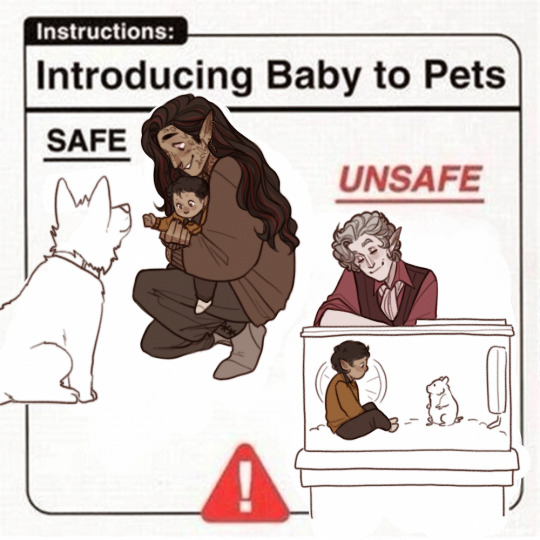

#bg3#baldur's gate 3#astarion#tavstarion#maybe i’ll make some actual art if someone can come up with a VERY good reason why he would agree to it#dorian would be a GREAT dad though#don’t worry as soon as i have a character who gets with gale i’ll dad the fuck out of him#for now they’re the funcles#maybe after a decade of therapy?#i hate that i did this because dorian and the bab are SO cute that i want to continue
3K notes
·
View notes
Text
Prompt 271
“Grandmother is visiting,” Damian suddenly said with no warning and with his usual not-quite demanding tone.
“Who?” Tim wasn’t the only one to startle, seeing as Bruce had practically froze, a downturn to his lips in a silent show of confusion.
Damian scowled. “Are you deaf Drake? Grandmother is coming to Gotham to, quote, make sure I am being properly cared for.” None of them had known that Ras was with anyone actually. At least Tim was pretty sure that would have been in the files.
“Oh?” Dick didn’t quite crouch to Damian’s height but it was a near thing. “She-” “He,” Damian corrected, interrupting him. They all exchanged a glance before Dick continued.
“Is he coming to the Manor or…”
Damian scoffed again, a tiny bit of a flush against his face. “No, Grandmother will most likely be staying with Akhi-”
Now wait one moment-
“YOU HAVE ANOTHER BROTHER?!”
#DCxDP#DPxDC#Prompts#Deadly Decisions#Danny & Ras are the homoerotic rivals that no one knows if they’re flirting or attempting a murder#It’s actually both they’re just also both Immortal#Danny to Jason: You can become a crime lord if you finish college- you’ve said you wanted to get a degree this is ur chance#Dusan (nodding): Mother has made all of us finish at least our basic education nephew#Why yes this does mean that RH has just made the heads in a duffel bag debut & the bats have no clue it’s Jason#Normally Danny wanders the universe but RAS (affectionately derogatory) HOW DARE U TRY TO HIDE THE GRANDCHILDREN#Morally Gray Danny#He’s well over 300 and that has an affect lol#Also has some fun fae vibes thx to his ghost half & human half finally balancing out#Let Jason & Damian be brothers#Tiny Damian: Akhi look I found a frog :>#Jason (newly not brain damaged & has no clue who this small child is): …. That’s great#Tiny Damian: *GASP* Akhi you can talk now :D#Fuck it- all the Al Ghuls deserve fangs from ecto contamination#Is Danny actually Dusan & Talia’s mother? No one knows and no one wants to ask the probably immortal fae being okay#Danny brought Damian a ghost hound puppy & Jason an original signed Pride & Prejudice book#How come Bruce wasn’t aware of Danyal? Talia forgot to inform him that the mother she was speaking of is in fact still alive#He disappears for a decade sometimes longer she was using past terms how was he supposed to know
2K notes
·
View notes
Photo

Whether the Sergeant’s takeover of the Inspector’s body will count as one of the Inspector’s incarnations
will remain a debate for years (if not decades) to come.
#Inspector Spacetime#The Might of the Inspector (special)#The Might of the Inspector (episode)#Centenary Special#the Sergeant (character)#takeover#the Inspector (character)#the Inspector's body#should it count as#one of the Inspector's incarnations#even though it was undone in the end#Fourteenth Inspector#14th Inspector#will remain a debate#for years to come#for decades to come#perhaps he was the 14th Inspector#Daniel Landlord (actor)#15th Inspector
0 notes
Text
"Oh dear," the unicorn thought. "I must've really mucked up the story beyond compare! The Red Bull Luo Binghe is protecting the last unicorn scum?! Unconscionable! He should have driven me off the cliff by now!!"
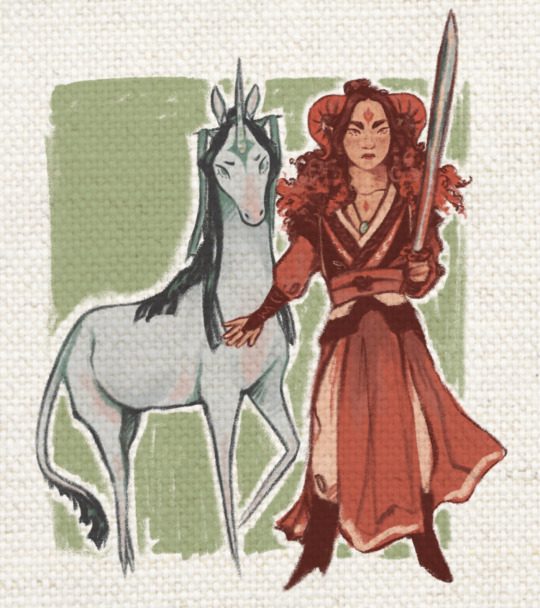
#dont ask why binghe gets to be a human but sqq has to be a unicorn#maybe hes prince lir in this au actually wait omg that would be good#half human half red bull sxy was freakay#the unicorn turning human to disguise herself is obviously sqqs plant body allegory#binghe sniffing around the castle: where is shizun i can still smell him? suspiciously sqq shaped human: gulp#binghe's tragic backstory in this au i guess is that he meets shen qingqiunicorn as a kid and sqq can sense that hes half fae and so#takes him semi under his wing but is like a prick about it until binghes seal breaks and they find out that hes a red bull fae#and shen jiu stabs him into the ocean something something abyss he comes back gets adopted by haggard kills every unicorn by throwing them#into the ocean as well before picking off shen jiunicorn last. and then sy fucks it all up#it's been like a decade since i read the book sorry#svsss#scumbag self saving system#scum villain's self saving system#bingqiu#shen qingqiu#sqq#lbh#luo binghe#my art#svsss last unicorn au
958 notes
·
View notes
Text
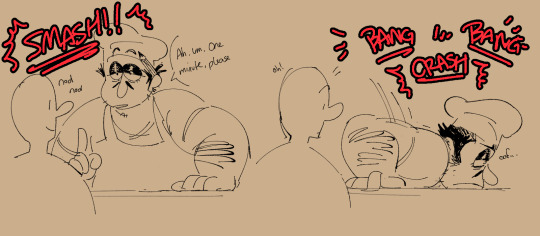


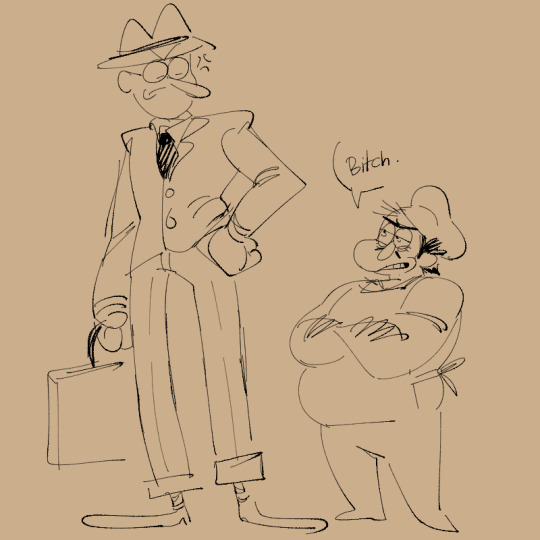
small
#pizza tower#peppino spaghetti#peppino#fake peppino#he barely comes up to the top of the booth chairs#short king who came to terms w that decades ago#fake peppino is so nice to have around bc he doesnt need to drag the stepladder everywhere anymore
3K notes
·
View notes
Note
I know we live in a very different world now, but I find it concerning how the newspapers printed all these kids' addresses. Did any harm ever come from that, to your knowledge?
I feel like the concept of your address being private information is a very modern one. Any news story until the mid-20th century (and much later in small towns/rural areas) would include the addresses of the individuals involved. Even the smallest towns printed yearly city directories that listed everyone's current address and occupation. So I can't imagine anyone would hesitate to publish a child's address, as why bother concealing what was already considered public information?
Furthermore, the concept of stranger kidnapping - and 'stranger danger' in general - was not something that really entered the public consciousness in the US until the 1920s, and even then the vast majority of kidnappings were for ransom. It was something that happened to rich people, usually in big cities.
It wasn't until several extremely high profile kidnappings of children in the late 20s/early 30s (namely Marion Parker, Walter Collins and Charles Lindbergh Jr.) that the concept of a stranger taking your child would probably have even crossed the mind of the average parent.
Additionally it's important to understand that the role of small town newspapers (where most of the Dear Santa letters are from) was something closer to Facebook or the Nextdoor app than a source of important news. Going on a trip? It's in the newspaper. Having a small dinner party? That's getting reported, along with the guest list, menu, party favors and any decorations you put up. Your child built a particularly nice snowman? There's a reporter here and entire town will know before dinner time.
So is it possible that some burglar used a Dear Santa letter to target the home of a wealthy child sometime in the 1890s? Sure? But I can't see why in an era where if you wanted to know where someone lived you could stop any random person on the street and say "Hey, where do the Johnsons live?" and no one would hesitate to tell you.
#asks#@kimbearablykute#history#crime history#my niche expertise on crime in early 20th century california comes in clutch every half decade or so#newspapers
705 notes
·
View notes
Note
are you secretly the CEO of solkat
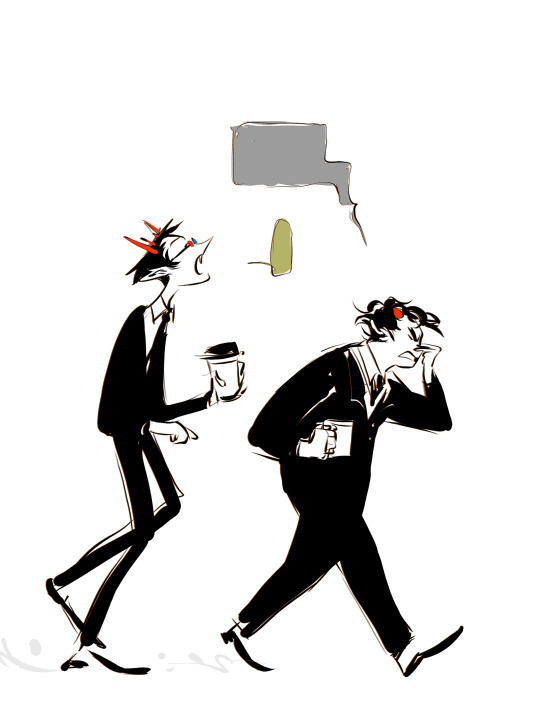
solkat r the ceos of me. actually
#am but a fresh minnow in this decade old aquarium i dont feel worthy of this title#as a chaser of the trail left by the established reigning fish i say‚#the yaoi game of the og slkts are insane!11 i cannot hope to come close#also i think solkat might b more than tumblr.?#there are bubbles of slkts living in other ecosystems that we tumblrinas are not privy to for sure :o#ask#anon#homestuck#2024#sollux captor#karkat vantas#solkat#vioart#ok as candidate-in-training my slkt take of the day is that they have a startup tgt ☝️🤓#worst bosses ever btw these two grind so fucking hard#if u dont keep up w them whoopee youre booted off for killing the team spirit so dead even the mediums wont absolve u#their company culture bonds over shitting on ex-employees :(
1K notes
·
View notes
Text
I remember a really bizarre exchange I had on my old Tumblr back in 2015 where I argued with an anon over asks bc I wanted to eat less sugar in my diet so that I'd have less painful acne breakouts. and they took it SUPER personally for whatever reason and I specifically remember a banger line where they said something along the lines of "if you're gonna be the fucking sugar police then im becoming a sugar terrorist" and I still don't know what it means today
#ik this sounds like a fake tumblr story but bruh mid 2010s teenagers were SOMETHING ELSE#anyways this shit is part of why i quit Tumblr and didnt come back till half a decade later#btw cutting sugar really did improve my acne i have fantastic skin now 👍
981 notes
·
View notes
Text

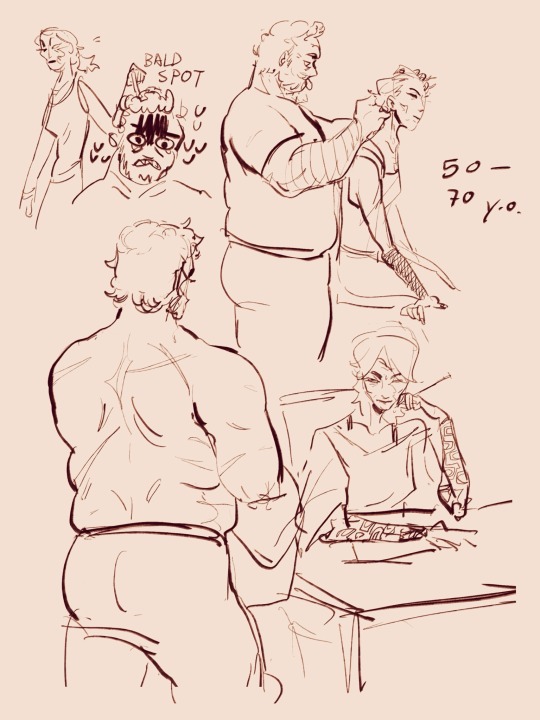

Older Wulfstrid is a yaoi couple in a yuri kind of way
#hey siri what is the word for a depraved bisexual situationship#they finally allow themselves to be a little silly#Eadwulf proposes like 183 times but Astrid always refuses#I just think it would be funny if they married like a decade after the shadowgast wedding#Astrid intentionally keeps her hair messy so Wulf will come along to brush it (she will be in the grave before she admits that)#critical role#critical role fanart#sturm und drang#astrid beck#eadwulf grieve#wulfstrid#imagine two wizards#wish people would give Wulf some more credit he’s actually smart but no one cares enough to talk about spells with him#i know Matt and Liam/Caleb care about Wulf but he always feels like an afterthought in c2 :(((
480 notes
·
View notes
Note
Hi! I’m starting to learn French and one thing that’s both cool and weird to me is how everything is gendered in a way (referring to someone/whose saying the statement/etc.) and I was wondering how that relates to people who identity as non-binary or gender fluid in France? Are there equivalents to they/them pronouns or neo pronouns in French?
I do plan on doing my own research about this but I figured since I love your blog and you’re really open about different cultural lgbtq+ communities I’d try here first!
That's an awesome question... with a complicated answer lmao. So buckle up and bear with me !
Basically, you can't be non-binary in French. The community found ways to do it but it's not mainstream. Most of the time, they're going to get misgendered or will have to misgender themselves to get understood.
Some things I'm going to list here are not proper French. Actually, they can even be forbidden in some circumstances, according to the law (the use of inclusive language, and more specifically le point médian, was made illegal in schools in 2021 for ex) or simply because your company etc forbids it. So use this wisely, there is a time and place for inclusive language in France.
That said, things have greatly developed over the last two decades. Which was partly because of the queer community and mainly because of feminists, who are tired of the way French erases women. More and more people are using inclusive language, at least in some circumstances and circles (for ex, i wrote my master's thesis in inclusive language and it was accepted bc i was in a leftist faculty). And inclusive language is debated as a serious issue now, which is saying something.
So, how do you use inclusive language in practice?
There are different ways, as it's informal and mostly new. People are still testing new things and trying out various methods. You can stick to one or alternate or mix them up.
Pronouns
Officially, there isn't a gender neutral pronoun. We don't have an equivalent to they. You're either talking about a man or a woman. If it's both, you use masculine pronouns ("masculine trumps feminine" rule). Same thing if you don't know the gender of the person ("masculin générique").
The most common neopronoun is "iel" (plural : iels), which is obviously a contraction of the masculine pronoun "il" and its feminine equivalent "elle". It works for nb folks or to avoid talking about someone's gender or to refer to a group of men and women. So it's equally used by the queer community and feminists.
I'm pretty sure other neopronouns exist but I can't think of any at the top of my head.
Choosing the right words
Sometimes, inclusive language is just about learning to use alternatives.
Instead of using gendered words, you can choose to use gender-neutral words or words "épicènes", aka words which are identical in their feminine and masculine form. For ex, instead of "homme politique" or "femme politique", you can use "personnalité politique". Personnalité is a feminine word but it's actually gender-neutral as you can use it for women and men alike. "Élève" (student) is épicène, as a female student and a male student are both referred to as "élève". Although épicène words as a gender-neutral option only work in their plural form, as you have to choose either a feminine or masculine article for the singular ("les élèves" is inclusive but it can only be "un" or "une" élève).
As good as this method is, it can be quite limitating. Your vocabulary will be drastically reduced and it can be quite hard to master that kind of speech so you can reach the point where you don't have to think everything over for ages before you open your mouth.
With oral French, you can take it a step further by choosing words that sound the same even if they have a different spelling. Ex, friend is "ami" or "amie" but it's pronounced the same way so if you say it out loud, people can't know how you're gendering it (as long as there isn't a gendered article/word with it ofc).
It avoids misgendering people but the downside is that, as masculine is considered neutral in French, people will often think : no gender specified = masculine. Not even because they're sexist or whatever, it's just so ingrained in our brains that it's a knee-jerk reaction.
That's also why most feminists often prefer to use explicitly feminine words when talking about women. For ex, they prefer the word "autrice" to "auteure" (female writer) because the second one sounds the same as its masculine version "auteur". And as previously mentionned, out loud, people will assume by default you're talking about a man. It's a big debate though, lots of women prefer words that sound masculine - going as far as refusing to use feminine words at all! Which sounds cool and gender-bending as fuck but in reality comes from feminine words traditionally seen as less legitimate and serious. Even today, if you look up the word empress "impératrice" in a French dictionary, the first definition that comes up is "wife of an emperor". "Woman ruling a country" comes second. Using a masculine title to refer to women can also be a way to mock them and show they're not welcome (a french deputy got fined in 2014 because he called the female president of the national assembly "Madame le président" and refused to use the feminine title "Madame la présidente").
Recently the tendency and official guidelines have been to feminize words, so I'd say go with that by default, but respect other people's choice if they specify how they want to be called.
Anyway I'm getting off-track but what I meant was that in French, if you avoid talking about gender, you're automatically erasing women (and nb people). So if you want to include everyone, you need to make it obvious.
Inclusivity as a statement
The most common way to make women and men equally visible is the "point médian" rule, which you can also use to refer to non-binary people as it avoids picking a specific gender.
Basically, it means pasting together the masculine and feminine forms of a word and using dots/middle dots/hyphens/parentheses/capital letters to create an inclusive word. For ex, instead of saying acteur (♂️) or actrice (♀️) for actor, you'll write "acteur.ice". For the plural form, there are two schools of thought : either you separate the feminine and masculine form AND the suffix used to signify the plural, or you don't. Aka, "acteur.ice.s" or "acteur.ices". Personally I prefer the second option because less dots makes it easier to read and faster to write, but it's an individual choice, both work.
There are two major downsides to this method : it only works in writing + it isn't doable for every word, as feminine and masculine words can be quite different and pasting them together that way would be unintelligible. Ex, "copain" and "copine" (friend or boyfriend/girlfriend depending on the context) would give something like "cop.ain.ine"...
You can work around that by choosing alternative words (as previously stated!). And it's still a pretty good method, especially as it works for any type of word (adjectives etc). Some people argue that it's hard to read and ugly but personally I think it's just a matter of habit (although it does pose a problem for people using screen readers). Be aware that it is the most controversial version of inclusive writing, as it's the furthest structure from how languages typically work.
If you don't like dots or want an alternative for oral speech, you can also straight up create new words that sound both feminine and masculine, making them gender-neutral. To use the previous example, "copain" and "copine" become "copaine".
Obviously, this only works if it's obvious which words they're based on. I think it's a great way to make French more inclusive but I'd advise against using it with uninitiated people as it would probably confuse them more than anything. This method is still quite niche.
An inclusive, yet binary language
As you've probably figured out, inclusive language remains quite binary in the way we approach it. It's more about making things both masculine and feminine than transcending gender and creating gender-neutral alternatives. Probably because inclusive language was more often a will to stop women from being erased rather than a non-binary friendly gesture.
Which means, there are also some rules that were created to avoid the "masculine trumps feminine rule" but don't allow room for non-binarity at all. I'll still explain them because they're interesting and you might encounter them at some point.
The proximity rule ("règle de proximité") is one of these. It existed in Ancient Greek and Latin but was dropped in Modern French in favor of the masculine trumps feminine rule. Basically, you gender things according to what's closest in the sentence instead of systematically using masculine words to gender a mixed group. For ex, instead of saying "Les hommes et les femmes sont beaux" you say "Les hommes et les femmes sont belles", as the subject "femmes" is closer to the adjective "beau/belle" than "hommes".
Another method is to systematically use both masculine and feminine words (which I personally find excruciating to write and read). Meaning, instead of writing "Les étudiants mangent à la cantine" (students eat at the cafeteria), you'll write "Les étudiantes et les étudiants mangent à la cantine".
This is mainly for the subject of the sentence : adjectives and such are gendered according to the masculine trumps feminine rule. The point is to explicitly include women, not to make the sentence unintelligible or gender-neutral.
When following this method, you also have to pay attention to whether you put the feminine subject first or the masculine. The rule is to follow alphabetical order. For ex, in "l'égalité entre les femmes et les hommes", "femmes" comes first because F comes before H. But in "Les auteurs et les autrices de roman", "auteurs" comes first because E comes before R. Etc.
This method is common as it's the only inclusive language you can get away with, given that it's a valid way of speaking French. It's even mandatory in some situations now, like in job descriptions for the french administration, in the spirit of gender equality.
So, how do I gender a non-binary person?
In short, you can use the pronoun iel + avoid gendered words and/or use the point médian and/or make up new words.
But keep in mind that if you're not talking to someone familiar with these rules, you'll have some explaining to do. And looots of people are still very anti inclusive language, because they're sexist and/or transphobic, ignorant, language purists, etc. A few years ago it was the thing to be angry about for conservatives and anti-feminists so it's still very controversial. But if you're in a trans inclusive queer space or talking with intersectionnal leftists, go for it !
I hope I covered everything (fellow french, don't hesitate to comment!) and didn't put you to sleep lmao. If you want to see some examples, you can look it up on Wikipedia or check #bagaitte on tumblr (it's the french queer tag) 😉
#it's a slow but steady effort!#the fact that it was accepted by my uni teachers shows how far we've come already#a decade ago it would have probably been dismissed#i don't even know if i was aware this existed a decade ago#😅#anyway THANK YOU for this ask#i hope it was comprehensive and helpful#ask#language inclusif#écriture inclusive#inclusive language#upthebaguette#bagaitte#french#languages
1K notes
·
View notes
Text
Honestly Cleo walking up to Bdubs - canonically her ex husband - and calling Etho Bdubs boyfriend only to then go and off and - in their own words - marry Etho? Absolute legend. Their power is unrivalled.
#secret life#secret life smp#slsmp#slsmp spoilers#traffic series#trafficblr#traffic smp#life series#zombiecleo#bdubs#bdoubleo100#ethoslab#cletho#cledubs#ethubs#clethubs#their polycule dynamic will continue to baffle our scientists for decades to come#choosing not to tag shipping since this is all just quoting canon?#on the fence about it though#mcyt#mcytblr#the void collection
768 notes
·
View notes
Text
Prompt 218
“Moom, there’s yellow-eyed creeps fighting ninjas outside the window again!”
Danny sighed, taking a deep breath- in for ten, out for eight- as he set the pot he was cleaning back in the sink. Dan- currently six- came running in from the living room of the apartment, where he was watching TV. Or he should have been if not for the bullshit outside.
He sighed again, picking up baby Ellie- currently closer to two- out of her highchair (even if she could just float out) and let his oldest drag him to the window. Sure enough, another fight was happening, with no vigilante in sight stopping it. Look, he knew most people didn’t live here, but it was still rude.
“Jordan, remember how I told you how violence isn’t always the answer?” Danny asked sweetly, Dan’s expression shifting to a wicked grin as he opened the window. “Feel free to practice tossing some fireballs while I clean up your sister, yeah?”
Ah, the sweet sound of surprised cursing and startled ecto-signatures. Maybe they’d be polite enough to take their spar elsewhere.
#DCxDP#DPxDC#Danny: I’m going to be a better parent than my parents & not get distracted by work#He has a couple of the clones’ cores too#Does it count as mpreg?#Danny has a garden shop/bookstore at ground level#He’s gotten better at cooking but he doesn’t trust them not to come alive so he sticks to drinks#Halfas are like phoenixes when they have to retreat to their core#They come out as babies thanks to having to rebuild their human flesh body from scratch#Why yes they’re in Gotham- he’s lived in several different cities over the last few decades#Doesn’t look a day over thirty somehow (it’s the ectoplasm)#Space Core Danny#Sun Core Dan#Moon Core Ellie#Why yes he named his clone-sons after stars#Shadow Core Orion#Bed Sheet Ghost#Earth Core Rigel#Monster Ghost#Light Core Algor#Tiny Ghost#Sun Core Draco#Yes Danny is an adult with a pair of small children & 4 more on the way what of it#dad danny#Mom Danny#He is both#prompts
1K notes
·
View notes
Text
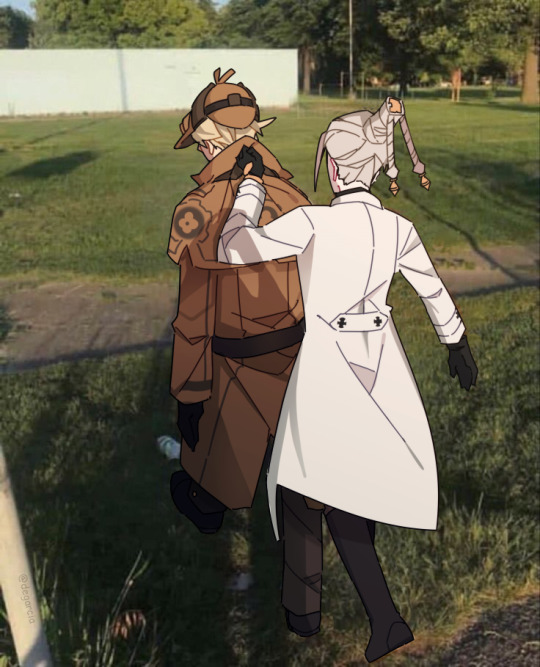
Sholmes after being kicked out of the forensic laboratory for the 5th time this week: Queen forbid a detective has hobbies
#herlock sholmes#courtney sithe#the great ace attorney#dai gyakuten saiban#tgaa#dgs#doesnt make any dgaa content for half a decade and comes back with a shitpost meme and a comic sans signature#bringart#not very shrewd of you sholmes
485 notes
·
View notes
Text
this has probably been said but i cant believe shane madej, the one who says steal from the rich, is agreeing to put this behind a paywall
#this sucks dude#ive been watching these guys for probably a decade or so now#and theyre doing this#idk man#nobody thinks this is a good idea.. nothing good could come from this#nobody cares about better quality..#sorry this is js really disappointing to see#watcher#shane madej#ryan bergara#shane and ryan
243 notes
·
View notes
Text


EVEN MORE NEW AMANDA PICTURES
#saw x#amanda young#saw#john kramer#OH MY GOD AMANDAAAAAA SHE LOOKS SO GOOD UGHHHH#we are getting yet another iconic amandle look to be remembered for decades to come
564 notes
·
View notes
Text


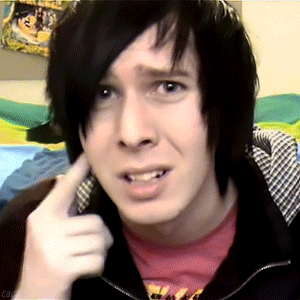



phil lester: then ⤐ now
happy 37th birthday @amazingphil!!!
#it's midnight in the uk so it's phil's bday now!#ty for all that you do king!!! your videos have been such a constant in my life for over a decade now#and your wit and personality and creativity never fail to brighten my day#it's amazing (lol) everything youve done and the community you've built#wishing you the best bday ever and best year to come <333#phil lester#amazingphil#phil#dgpdaily#cactuslestergifs#also this is a simple set because i am lacking time and inspiration but i wanted to do something still#picked some of my fave early day videos <333#i miss sebastian universe defender
301 notes
·
View notes